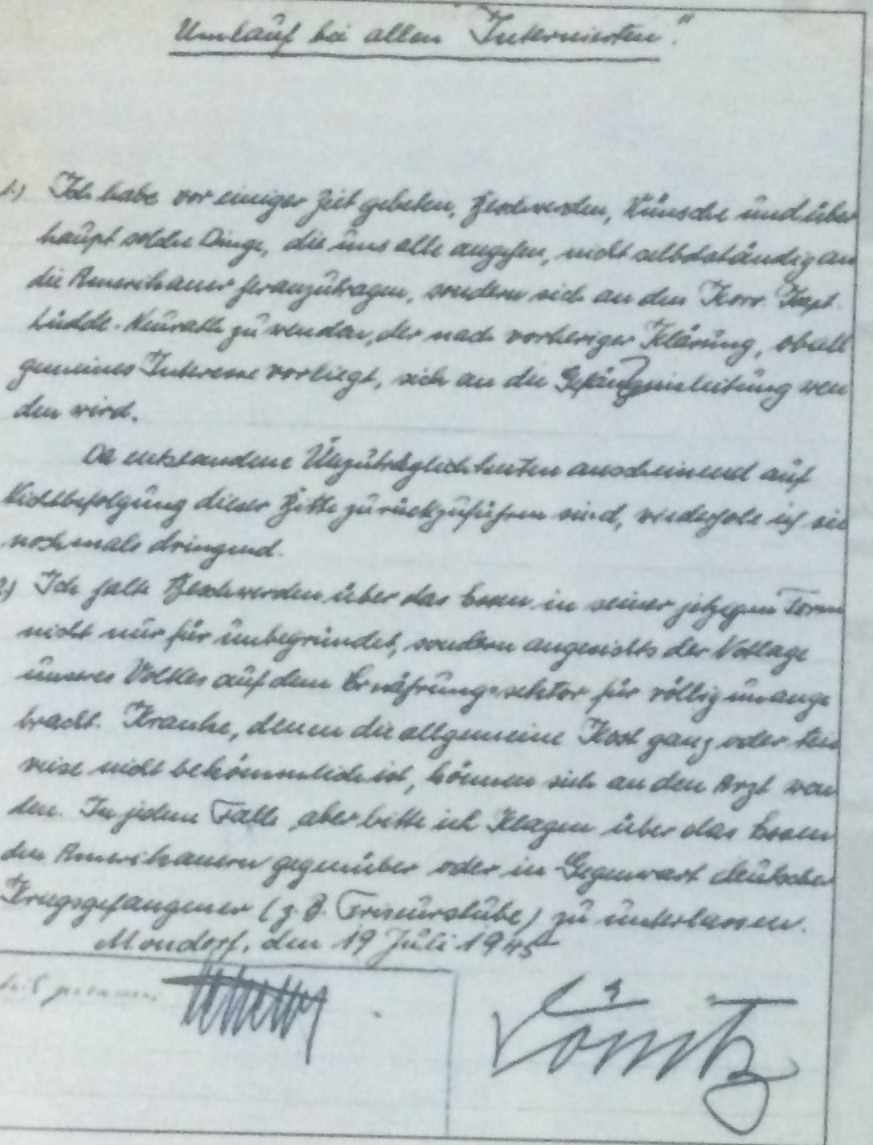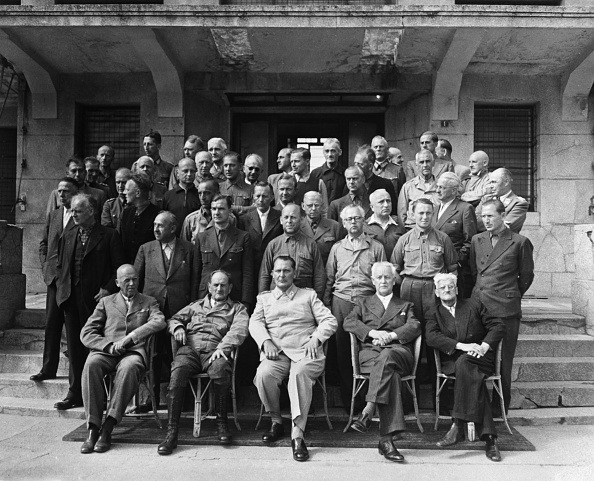The small European country was used as a top secret, high security jail for big shots of the Nazi regime like Goering and Ribbentrop after the Allies captured them. Largely forgotten, this unique episode in the history of Luxembourg has only a few witnesses. John Dolibois is a happy man. Now that the Second World War is about to end, he can finally return to his native country – the peaceful and lush Grand Duchy of Luxembourg. Since he escaped the German invasion by running away to the United States, he has been an intelligence officer for the US army. And his last mission seems like a dream job: staying in the Luxemburg spa resort town of Mondorf, in the once luxurious grand hotel, to interrogate a prisoner. As he unpacks his suitcase in his bedroom, someone knocks at the door. When he opens the door, John finds himself facing a huge German man with piercing blue eyes and a heavily ornamented uniform who stiffly gives him a Nazi salute and introduces himself in a booming voice: “Hermann Goering, Reichmarshall”!
That day, Lieutenant Dolibois discovered his mission. Here in the Grand Hotel of Mondorf, in Luxembourg, the Allies gathered all the senior Nazi officials as they arrested them one by one during their invasion of Germany. Goering is only one of them. More than forty top ranking Nazis, all tainted with various gradations of war crimes, occupy the other bedrooms. In utmost secrecy, Dolibois is expected to interrogate them, while a full crew keeps them secluded and alive for the upcoming Nuremberg Trial.
This is June 1945, just after the war formally ended in Europe. The trial will not open until November. Between those two months, there is a lacuna in most history manuals. This is the story of what happened in the summer of 1945, when Hitler's associates were incarcerated in the most unexpected location: the Grand Duchy of Luxembourg.
Lieutenant Dolibois was not the only major actor confronting this infamous gang. Colonel Burton C. Andrus, an American officer, had been put in charge of the prison. The Grand Hotel had been stripped of every sign of luxury in order to appear as austere as possible. In the bedrooms, Andrus replaced the comfortable furniture with the kind of metallic beds used by soldiers. He broke all the windows to replace them with bars and surrounded the hotel with a barbwire fence and watchtowers. Signifying its change of status, the Palace was dubbed the Ashcan.
The Palace was surrounded with barb wires and watchtowers.
There was wide secrecy around it, and Luxembourg had been picked because the small country was seen as a more discreet location than France, Belgium, or Germany itself. MP Sergeant Robert Back, who guarded the entrance, said “you need a pass signed by God himself to be let in”! At the time, the Allies feared the rise of a sort of Nazi German resistance made up of former SS men capable of freeing their fallen leaders - a plan called Werewolf by the Nazis. This never happened, but Andrus took no risk. He had 40 prisoners – but for everyone, the real star of the show was Goering. Soon, word came through Mondorf about the identity of the inmates, and children out of school would run to take a peek at them through the fence, chanting, “let's go see the Goerings”.
The fallen Reichmarshall outranked every soldier in the Wehrmacht and was Hitler's designated successor until the very last minute. Like most Nazi leaders, he was completely delusional about his perception by the Allies and willingly surrendered to American soldiers who came to meet him, thinking he would be treated as a head of state. Instead, he was flown to Mondorf, where Andrus greeted him like a convict. According to testimony at Mondorf, Goering arrived with a valet and dozen of suitcases full of luxuries. Andrus seized it all and made an inventory that included such valuables as a golden cigarette box apparently stolen from the King of Yugoslavia and bearing his monogram. His nails and toenails were varnished. At some point, Andrus tore away Goering's shoulder pads. For the rest of his life, Goering would only wear the jacket of a Luftwaffe soldier.
But Andrus was also charged with keeping his prisoners safe. Eager to put them on trial, the Allies were worried the Nazi leaders would commit suicide, like so many already had - Hitler himself and Himmler Goebbels among the most infamous. Andrus took away cyanide pills from luggage belonging to Goering and others, who sometimes had them taped under their feet or sewn inside their clothes. In particular, Goering was morbidly overweight and took a handful of codeine pills morning and evening. Andrus ensured that he was weaned off the drug, systematically reducing his daily dose. One night, Andrus was awakened urgently because Goering was having a “heart attack”. In fact, he was reacting to the lack of codeine. In the end, he was safe. At the trial, he was significantly slimmer. “I have a solid health”, bragged Goering the next morning. “No you don't”, answered Andrus unimpressed, “you winged during the weaning process”.
The Allies took a mugshot of every Nazi that transited through the Palace. The infamous Reichmarshall Hermann Goering poses here in what is likely to be his last picture wearing his fancy uniform, whose gallons were torn away minutes afterwards by the prison head.
Goering and the other guests of Mondorf were highly delusional. Andrus’ and Dolibois' notes, as well as testimony from former personnel, depict absurd scenes involving the rivalry between Goering and Dönitz. The former head of the German navy, Grand Admiral Karl Dönitz was surprisingly named “President of Germany” in Hitler's last will. Losing his trust in Goering at the last minute, the Führer excluded him from his succession and nominated Dönitz instead. But the Grand Admiral sort of ruled what was left of Germany for a mere twenty days before the surrender was signed, and he was arrested. Still, at Mondorf, Dönitz and Goering bickered endlessly about protocol and respect. They both claimed the right to preside over the table of inmates during lunch, and refused to let each other pass through a doorway first. In the end, Andrus had to solve the problem by dividing the inmates in two tables presided by each of them. And they avoided passing through a doorway at the same time.
These ridiculous games carried on the whole summer. Andrus intercepted a hand-written note by one of the inmates asking for better food and signed by all Nazi prisoners, to be sent to Gen. Eisenhower. At some point, Goering pushed his dish away claiming it was “food barely good enough for my dogs”. A German soldier who served as his valet finally snapped at his fallen master by commenting, “in this case, Sir, your dogs were better fed than us German soldiers were on the Eastern Front”. Common German soldiers serving as personnel in the Ashcan nicknamed their former masters “die Bonzen”, a German expression for “the fancy-pants”.

Delusional about their position, the prisoners thought ...and all his prison mates on the back, making it an
they were entitled to write a petition to the Allies unlikely collection of autographs.
leaders to ask for better food, in this manuscript
letter signed by Grand-Admiral Doenitz...
Other inmates gave up any dignity. Robert Ley, who once supervised all forced labour in Nazi occupied Europe, was masturbating in his room when a guard entered. Ley did not bother interrupting his self-pleasure, saying “what are you looking for? I'm only a man after all”! According to an American guard, Ley looked like a vagrant. Hans Frank, who had been the ruthless Nazi governor of occupied Poland, was still wearing the pyjamas he had on when he was arrested, as well as bandages testifying to a failed suicide attempt. Albert Speer, Hitler's architect, only stayed for a few days. He later wrote “it was a fascinating image to see all those men, who had scattered like straw in the wind, be gathered again here”.
In the middle of this glorified schoolyard, Lieutenant Dolibois had to get all the information he could. He interrogated the Nazis, but with little success. He had a strained relationship with Andrus, who, he claimed, was strict with the inmates to the extent that they refused to talk. Dolibois was eager to relax the conditions of their detention in order to milk them for intelligence. He was also disturbed in his work by the eagerness of every allied power to send an interviewer and talk to the inmates. When a Soviet agent arrived, Goering freaked out, claiming he would “refuse to meet him”. In the end, the Soviet agent talked to generals but did not even ask for the Reichmarshall. Goering took this snub as an insult. Dolibois' personal notes are full of such anecdotes showing how hard it was to deal with the massive ego of the Nazi criminals.
A handful of prisoners were more cooperative. Hungarian dictator Miklos Horty was among them. Horty was a fascist who later broke with Hitler because he disagreed with the deportation of Jews and ended up a prisoner of the Nazis. Franz von Papen was another one - a nationalist who helped Hitler become chancellor because he believed he could manipulate him and use him as his personal straw man, only to be marginalized within a few months. They were separated and interrogated in a more comfortable house that still remains today - the only remnant of Nazi detention at Mondorf, since the Grand Hotel was demolished in the fifties when it became apparent that some neo-Nazis were visiting it as a sort of shrine. The present-day spa centre of Mondorf is located in another part of the town.
Dolibois conceived a plan to get Goering to talk. In the nearby village of Dalhem, a Nazi collaborator had been evicted and his villa was free to use. Dolibois had German furniture imported to make the house look genuine, and had Goering and a couple others driven to that place under the pretence that they were being “transferred to a better estate”. Confined to an ambulance, they were driven for hours around the Luxemburg’s countryside to give them the impression that they were being taken to Germany–the driver had to make turns in different directions, so they would not realise they were going in circles. Once in the house, the illusion was successful–Goering commented “I know this house! We are in Germany near Heidelberg”.
The house was stuffed with microphones, but Goering and his mates were suspicious and avoided conversations. In the garden, they thought they would be safe and sat under a willow tree to discuss. They were not aware that Dolibois had even put microphones in the tree.
But this success was short-lived. After a couple of days, Andrius turned up and demanded his prisoners: the Nuremberg Trial was finally about to start. Goering and friends were driven back to Mondorf in a few minutes, triggering anger in the Reichsmarshall when he realised he had been fooled. And from there, they were flown to Nuremberg.
The Nazi war criminals reappeared in Nuremberg where they were judged and many sentenced to death by hanging. Lieutenant Dolibois became the US Ambassador to Luxembourg. Colonel Andrus was again asked to take care of the prisoners, as he was named head of the Nuremberg prison during the trial. On the very last day of his mission, Goering exacted his revenge, having smuggled a cyanide capsule through means that remain unclear. Goering committed suicide a few hours before his execution. The resulting scandal pretty much destroyed Andrus' career.
As for Mondorf, most people have forgotten its past and it has reverted to its better-known reputation as a spa town. A much better way to enjoy it...
By Julien Oeuillet

